Could somebody explain how rewrite this SQL query to linq expression. What I'm trying to achieve: there is a jobs table which may have rows be active or not (is active bool column), also there is batch table which works as history for jobs runned. If user create new job in history table will be no records for it and I should get a null batch id but not null jobId in my app. Also it crucial i must get only max value from batch table for each job. i.e there is only one job with Id 1 in batch table there are PK with id 1 2 3 4. I need only one row with id 4.
select distinct on (b.type_id)
t.id as "JobId", b.id , t.interval_minutes
from types t
left join batches b on t.id = b.type_id
where t.is_active
order by t.id , b.id desc
I can't figure out how to write distinct on part. There is a issue on github with example but I don't understand how to integrate it to my code. My code:
(from types in Types
join batch in Batches on types.Id equals batch.TypeId into joinBatch
from jBatch in joinBatch.DefaultIfEmpty()
where types.IsActive
orderby types.Id, jBatch.Id descending
select new DTO() {
JobId = types.Id,
ExecTime = types.IntervalMinutes,
BatchId = jBatch.Id,
})
//.GroupBy(b => b.BatchId).Select(g => g.First()) //getting here an exception if batchid is null
.Dump();
public class DTO{
public int JobId {get; set;}
public int ExecTime {get; set;}
public long? BatchId {get; set;}
}
This code generates:
SELECT p.id AS "JobId", p.interval_minutes AS "ExecTime", b.id AS "BatchId"
FROM types AS p
LEFT JOIN batches AS b ON p.id = b.type_id
WHERE p.is_active
ORDER BY p.id, b.id DESC
GO

